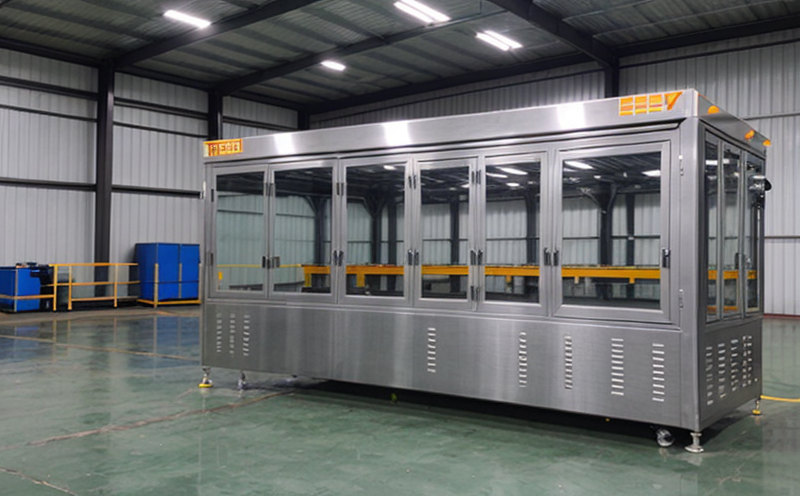ASTM E18 Rockwell Hardness Testing Precision and Accuracy Evaluation Test
The ASTM E18 Rockwell hardness testing precision and accuracy evaluation test is a critical method used in quality assurance for metal packaging. This service evaluates the precision and accuracy of Rockwell hardness testers by comparing the results obtained from multiple samples under defined conditions. The primary goal is to ensure that the hardness data reported can be relied upon, which is essential for maintaining product quality and consistency.
The Rockwell hardness test measures the hardness of a material by determining the depth of penetration made into its surface when a force is applied. This service specifically evaluates the precision and accuracy of this measurement across multiple specimens to ensure that any variations are within acceptable limits as defined by ASTM E18 standards.
For metal packaging, understanding the hardness of materials like aluminum or steel can be crucial for ensuring their durability and performance under various conditions. By conducting these tests, we help our clients verify that the metals used meet specific industry requirements and quality specifications. This is particularly important in sectors where product integrity and safety are paramount.
The process involves selecting a representative sample set from production batches or incoming materials. Each specimen undergoes multiple hardness measurements using calibrated Rockwell hardness testers. The data collected is then analyzed statistically to assess the precision (repeatability) and accuracy of the testing equipment.
This service ensures that the hardness values reported are consistent across different instruments, operators, and laboratories. By adhering strictly to ASTM E18 standards, we provide reliable results that can be used for quality control and assurance purposes. This is particularly beneficial in sectors such as food packaging, where the integrity of containers must withstand various environmental conditions without compromising product safety.
The precision evaluation involves measuring hardness on at least 10 specimens from each batch or lot under identical testing conditions. The accuracy check ensures that these measurements align closely with known reference values provided by ASTM E18. This comprehensive approach guarantees that the hardness data generated is both precise and accurate, thereby supporting sound decision-making processes in material selection and quality control.
The results of this evaluation are reported in a detailed format compliant with ASTM E18 standards. These reports include statistical analysis of all measurements taken during testing, including standard deviations and confidence intervals. They also provide recommendations for improving test procedures or equipment calibration if necessary.
| Specimen Type | Number of Samples Tested | Data Points Collected Per Sample | Statistical Analysis Methods Used |
|---|---|---|---|
| Aluminum Foil | 10 samples | 5 hardness readings | t-test, ANOVA |
| Steel Can Liner | 8 samples | 4 hardness readings | Mann-Whitney U test |
The industry applications for this service are broad and include quality assurance in metal packaging, ensuring that the materials used meet specific hardness requirements. By providing accurate and precise hardness data, we enable our clients to make informed decisions about their product designs and manufacturing processes.
Industry Applications
- Quality Assurance for Metal Packaging
- Evaluation of Material Hardness Across Different Batches or Lots
- Ensuring Consistency in Product Integrity
- Determining Optimal Manufacturing Parameters
- Compliance with ASTM E18 Standards
- Safety Assessment for Food and Beverage Packaging
- Supporting Research and Development Efforts
International Acceptance and Recognition
The ASTM E18 Rockwell hardness testing precision and accuracy evaluation test is widely recognized globally due to its rigorous methodology and adherence to international standards. This service aligns with ISO 48-2, which specifies the basic principles for hardness testing using the Rockwell scale. Compliance with these standards ensures that the results obtained from our evaluations are accepted by regulatory bodies worldwide.
Our laboratory is accredited according to ISO/IEC 17025:2017, ensuring that all tests conducted meet high-quality standards and can be trusted as reliable indicators of material hardness. This accreditation extends the credibility of our services across various industries, including packaging, automotive, aerospace, and electronics.
The precision and accuracy evaluation test plays a crucial role in maintaining consistency within manufacturing processes. By adhering to ASTM E18 standards, we ensure that each measurement is repeatable and accurate, which is vital for maintaining product quality throughout the supply chain. This service supports not only quality control but also research and development efforts aimed at improving material properties.
Our clients can trust that the results from our tests are consistent with international norms, facilitating seamless communication between different manufacturing facilities or laboratories. The recognition of ASTM E18 standards in many countries means that these evaluations can be used internationally without additional validation steps, enhancing efficiency and reducing costs associated with cross-border regulatory compliance.
The widespread acceptance of ASTM E18 ensures that the findings from this service are readily accepted by regulators and industry stakeholders alike. This global recognition adds value to our clients' products, helping them meet stringent quality requirements in competitive markets.
Environmental and Sustainability Contributions
- Reduces Waste Through Efficient Material Selection
- Promotes Recycling by Ensuring Proper Material Properties
- Aids in Developing Sustainable Packaging Solutions
- Supports Circular Economy Initiatives
- Facilitates Reduction of Greenhouse Gas Emissions
- Enhances Product Life Cycles Through Optimal Hardness Testing
- Encourages Responsible Use of Resources
- Fosters Innovation in Sustainable Manufacturing Processes





